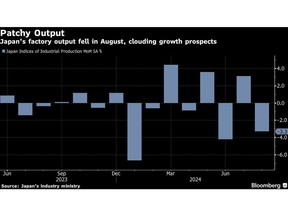Article content
(Bloomberg) — Surprisingly robust September job growth in the US undercut chances of another big reduction in interest rates from the Federal Reserve.
Inflation in the euro area eased back below the European Central Bank’s target and an Iranian missile barrage on Israel heightened geopolitical risks. Crude oil prices surged this week on fears Israel’s response would include targeting energy infrastructure.
Article content
Here are some of the charts that appeared on Bloomberg this week on the latest developments in the global economy, markets and geopolitics:
US
US job growth last month topped all estimates, the unemployment rate unexpectedly declined and wage growth accelerated, quelling concerns that the labor market is deteriorating. Payrolls increased 254,000 in September and gains in the prior two months were revised higher. The jobless rate fell to 4.1% and annual average hourly earnings growth was the strongest since May.
As historic floodwaters unleashed by Hurricane Helene recede across the US Southeast, the region faces a humanitarian, economic and ecological crisis of staggering scope, with effects likely to last years. Parts of the region are still struggling to reopen roads and reconnect power.
Service providers expanded in September at the fastest pace since February 2023, driven by a flurry of orders and stronger business activity. The survey suggests the economy was on solid footing at the end of the third quarter.
Europe
Euro-area inflation slowed below the European Central Bank’s 2% target for the first time since 2021 — backing investor bets that interest rates may be lowered more quickly than previously anticipated. Concerns about the economy, meanwhile, are on the rise — largely down to the increasingly dire prospects for Germany’s manufacturing sector.
Article content
France plans around €60 billion ($66.4 billion) in spending cuts and tax hikes next year as Prime Minister Michel Barnier seeks to claw back a widening budget deficit and bolster investor confidence in the country. President Emmanuel Macron also endorsed a temporary tax on the country’s largest companies, supporting his new government’s strategy even as it marks a shift from his pro-business stance.
Asia
China’s factory activity continued to contract while the services sector slowed in September, as policymakers prepared an emergency stimulus blitz to revive an economy facing challenges across the board.
South Korea’s semiconductor stockpiles dwindled at the fastest clip since 2009 last month in a sign of sustained demand for high-performance memory chips used in artificial intelligence development.
Japan’s factory output fell in August, adding to signs that the country’s economic recovery may lose momentum in the third quarter in a worrying sign for the nation’s new prime minister.
Emerging Markets
Benjamin Netanyahu vowed to retaliate against Iran after it fired about 200 ballistic missiles at Israel, a severe escalation of hostilities between the adversaries that world powers fear could spiral into a Middle East-wide war. Iran said its latest move was a reprisal for Israel’s devastating attacks on Lebanon-based Hezbollah, Tehran’s most important proxy militant group.
Article content
World
Crude oil posted its biggest weekly increase in more than a year on fears that Israel may decide to strike Iranian petroleum facilities in retaliation for a missile attack.
With the last traces of the global inflation shock fading, the shift toward lower borrowing costs is about to maintain momentum as economies tread toward a new year fraught with unknowns. Now that the Fed has joined rich-world peers with its own initial interest-rate cut, lingering worries about consumer prices are increasingly poised to give way to concerns about growth around the world, according to Bloomberg Economics.
Droughts, downpours and fires from Asia to the Americas are stoking worries about crop harvests, pushing up prices for food staples that could eventually flow through to higher grocery bills. The Bloomberg Agriculture Spot Index — which includes nine major products — had a monthly gain of more than 7%, the most since Russia’s invasion of Ukraine in early 2022.
Colombia reduced interest rates to a two-year low, while Dominican Republic, Mozambique and Iceland also cut. Poland, Romania and Tanzania left rates unchanged.
—With assistance from Gerson Freitas Jr., William Horobin, Ocean Hou, Charlotte Hughes-Morgan, Sam Kim, John Liu, Michael Mackenzie, Henry Meyer, Ari Natter, Marissa Newman, Yoshiaki Nohara, Ilena Peng, Augusta Saraiva, Josh Saul, Zoe Schneeweiss, Bernadette Toh, Alexander Weber and Keira Wright.
Share this article in your social network

